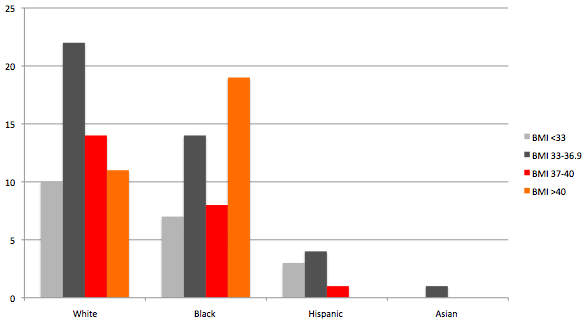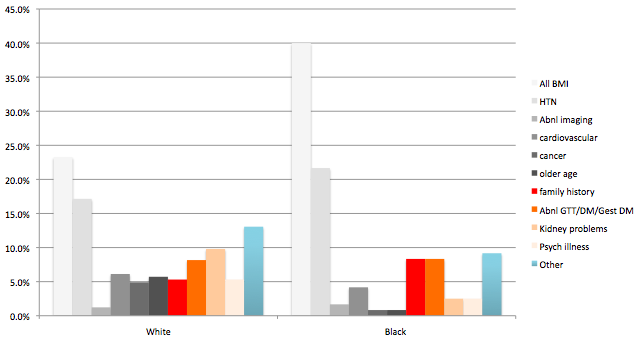Reasons for Ineligibility for Kidney Donation by Race: Gap for Blacks Represented by Modifiable Factors, However Are Big Hurdles to Overcome.
1Hospital of the University of Pennsylvania, Philadelphia, PA
2Children's Hospital of Philadelphia, Philadelphia, PA
Meeting: 2017 American Transplant Congress
Abstract number: A236
Keywords: African-American, Kidney transplantation, Obesity
Session Information
Session Name: Poster Session A: Living Donor Kidney Transplant I
Session Type: Poster Session
Date: Saturday, April 29, 2017
Session Time: 5:30pm-7:30pm
 Presentation Time: 5:30pm-7:30pm
Presentation Time: 5:30pm-7:30pm
Location: Hall D1
Background: It is well-recognized that blacks are much less likely to receive living donor kidney transplants. Improved characterization of the reasons for differences in living donation (LD) rates for black vs. white potential donors is essential to identify targets for intervention. Methods: We queried our single-center LD database and identified 960 potential living donors for 2013 and 2014. For each potential donor, we reviewed their referral forms, donor status (post-donation, active, or ineligible), and the reasons for ineligibility. Data were tabulated and compared by race. Results: For 2013-14 44% of total transplants for white recipients were LD vs 16.5% transplants for blacks. Blacks were less likely to be a back-up donor, suggesting lower likelihood of multiple donors per black (vs. white) recipient; eligible black donors were less likely to go on to donate (3.4 % vs 14.2%); and more blacks were considered ineligible (85% vs 77%). For Blacks (vs. whites), obesity represented a much higher proportion of the reasons for medical ineligibility. When separated by BMI, almost 40% of Black potential donors marked ineligible for BMI had a BMI over 40. Additionally, disqualification for the reason of family history among blacks represented almost twice the proportion it did for whites. Conclusions: Morbid obesity represents a major barrier to living donation among blacks in our center. These data highlight the importance of increasing education around the understanding of potential recipients and donors about criteria for donation, as well as addressing the significant problem with obesity within this community. Further, more data are needed to inform consideration of and consent among potential black donors with positive family history. 

CITATION INFORMATION: Simpson D, Levine M, Amaral S. Reasons for Ineligibility for Kidney Donation by Race: Gap for Blacks Represented by Modifiable Factors, However Are Big Hurdles to Overcome. Am J Transplant. 2017;17 (suppl 3).
To cite this abstract in AMA style:
Simpson D, Levine M, Amaral S. Reasons for Ineligibility for Kidney Donation by Race: Gap for Blacks Represented by Modifiable Factors, However Are Big Hurdles to Overcome. [abstract]. Am J Transplant. 2017; 17 (suppl 3). https://atcmeetingabstracts.com/abstract/reasons-for-ineligibility-for-kidney-donation-by-race-gap-for-blacks-represented-by-modifiable-factors-however-are-big-hurdles-to-overcome/. Accessed February 16, 2026.« Back to 2017 American Transplant Congress
